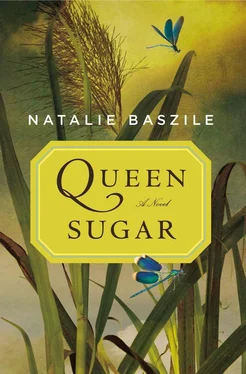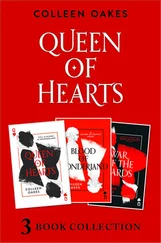Ralph Angel stepped to the edge. He looked down into the water and felt gripped by an old terror as he tried to judge its depth. He couldn’t swim. Had never learned. In all the years he’d come out here as a kid, he’d never dipped in as much as a toe. But now the thought of losing Blue — he’d already lost Gwenna, couldn’t rely on Hollywood — no, he couldn’t imagine. He forced the thought from his mind. And so, before he could talk himself out of it, he held his nose and jumped. The water came to his hips as it flowed out toward the bayou, but when his feet touched bottom, the grasses and sludge held for only a second before giving way and his feet sank into the mud. And suddenly the water was at his waist, then up to his chest as he crept farther out. He slid his fingers between the slip’s wooden slats, which were not just wet but slimy from having been submerged for a century, and with every step, his feet sank deeper until it was as though hundred-pound weights were strapped to his ankles each time he took a step.
Blue had inched all the way to the edge of the slip where it opened into the bayou. He still gripped the slats, but only with one hand now as he reached for Zach with the other, his small arm straining, his fingers spread wide. The back end of the barge had almost passed. Another few seconds, Ralph Angel knew, and the wave would gush back into the slip. He remembered the alligator and felt a clench in his chest as he scanned the water’s surface.
And then the water was coming toward him, curling over itself in a frothy wake, the swell looking much bigger at eye level than it did from up on the bank, the water hyacinths and lilies rolling at him like a dark carpet. Water splashed in Ralph Angel’s face, washed up his nose and down his throat; he tasted the bayou’s earthiness, felt himself lifted as the water level rose, heard the wave splash against the slip’s bulkhead, and a fresh panic ripped through him. The world went black. He was drowning for sure.
“Pop!” a small voice called.
Ralph Angel gasped for breath, wiped water from his face. He saw Blue dog-paddling toward him, his little body fighting to stay upright in the swirling current.
“This way, buddy,” Ralph Angel called. He stretched his arm as far as he could. “Swim this way.”
“Pop!”
“I’m right here.” Ralph Angel leaned out even farther because he couldn’t live alone in this world. “Just keep going, buddy. That’s right, swim to me.” He heard his voice catch in his throat. Water splashed in his face again and he wiped it away, and knew he wiped tears with it.
Blue was closer now and Ralph Angel was surprised by the look of fear, yes, but also determination on his son’s face. He hadn’t been able to save Gwenna because he was afraid, but he would save his son. Ralph Angel wiped his face again and reached across the water. “That’s it, buddy. I’m right here. Just a little farther.”
Mid-July now, Friday, and after the rainy false start, summer asserted its full magnificence with velvety morning air and peachy skies that turned glacier blue by noon, then a brilliant marbled red and purple at dusk. Laid-by and borer-free, the cane grew lustily, the swordlike leaves thickened, the roots deepened, the stalks pushed eagerly upward in the generous sunlight until they stood eleven notches high. And as Charley rolled along the northbound highway — the Polyester Power Hour, sixty uninterrupted minutes of seventies funk played on radio K-AJN, a glass of Tang nested in the cup holder, and two buttered slices of raisin bread wrapped in paper towel on the dash — she marveled at how far she’d come. A month ago, she hadn’t known the difference between a combine and a chisel plow. Now she read the Louisiana Sugar Bulletin like it was the New York Times and tuned in to Ag call-in shows with the same regularity she used to reserve for NPR’s Morning Edition. And while she still couldn’t spout the yield potential of 384 versus 321, she could eyeball a stand of cane and determine whether a wild boar had been in it; could tell the difference between Roundup and Paraquat. As the Kisatchie’s piney woods studded the horizon ahead, and Saint Josephine’s emerald cane fields shrank in her rearview, Charley thought she might be an honest-to-goodness cane farmer after all. It was enough to make a girl want to sing.
The auction was Denton’s idea. So far, they had gotten by on his ingenuity and a few pieces of jerry-rigged machinery, but the serious work of grinding was still ahead of them, and at eighty thousand dollars for a new tractor, two hundred fifty thousand for a combine, new equipment was out of the question. On their measly operating budget, used equipment was all they could afford.
Turning off the highway, Charley followed the trail of neon flyers down the service road and pulled in beside Denton’s pickup. She had assumed the auction would be held in some kind of warehouse or possibly an airplane hangar, but this place was no more than an open lot with patches of Saint Augustine grass forcing its way up through the gravel. Ahead of her, Charley saw rusted spray rigs and ditch diggers, fertilizer tanks and tires, tractors and level liners all arranged more or less by size and stretching out in long, ragged rows. The place looked like an enormous archaeological dig, the farm equipment like dinosaur bones baking under the unforgiving sun.
There must have been two hundred farmers in attendance, Charley guessed, as she got out of her car. She maneuvered through the roiling sea of men in cowboy hats and baseball caps, men whose necks and arms tanned a deep, brick red, and whose creased faces bore out their years of struggle and worry. She’d never seen so many discouraged and defeated white men; it was like Shiloh, Gettysburg, Antietam, and Verdun all rolled into one. She moved among them, nodding when her eyes met theirs. She passed a farmer who looked like he’d just learned his house had burned down with his entire family inside, while a beady-eyed man with a hyena’s skulking posture stared into faces as if trying to identify the weakest in the herd. Strings of multicolored flags wagged limply in the morning heat, country music wafted over the sound system, and the air smelled faintly of hot dogs, but it was impossible to ignore the gloom underlying the carnival excitement.
At the far end of the lot, Denton, dressed in yet another pair of Liberty overalls, leaned under the hood of a battered John Deere 4840—a make of tractor Charley recognized from pictures at the Blue Bowl.
She knocked on the chassis. “You didn’t tell me it would be so crowded.”
“I’m surprised as you.” Denton yanked an oily cloth from his back pocket and wiped his hands. “It’s late in the season, but I guess everyone’s looking for a deal. Got a lot of good equipment out here, but most of it’ll go for a fraction of what they paid.” He handed her a catalog. “Might want to flip through this before the bidding starts.”
CHESTER GROVELAND AUCTIONS
Liquidations, Bankruptcies, Asset Recovery
“‘We believe our commitment to God, ethics, and integrity can help turn your assets into cash,’” Charley read. She opened the catalog and studied photos of tractors and forklifts, sleek quarter horses and stocky Texas longhorns. “At least we can buy some cattle if we’re outbid on everything else.” It was a bad joke, Charley knew, but it was all she could manage. Truth was, she was nervous about their chances. They had budgeted thirty thousand for equipment, which was like strolling up to the high rollers’ table in Vegas with a dollar in your pocket. God help them if they were outbid.
Every few minutes, a farmer recognized Denton, called out to him across the yard or came over to say hello. The men shook hands, slapped each other’s shoulders. They exchanged news about other auctions, shrugged over interest-rate hikes for production and equipment loans, shook their heads mournfully over news of farmers who’d gotten out or gone under. Charley was surprised at how many people Denton knew. The younger farmers addressed him with respect, even admiration, while the older men greeted him like a brother. Though he was the only black farmer on the lot, he seemed at ease, Charley thought, carried himself with the quiet confidence of a diplomat, and while she couldn’t quite forget the story Denton told about the sealed bid and inside baseball, she guessed that in the end, every man there was just struggling to survive.
Читать дальше












